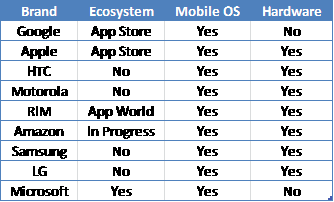Ecosystems at War
When the number of cell-phone subscribers in India surpassed the fixed-line subscribers, we defined it as a mobile revolution, appropriately so. But it limited itself mostly to making and receiving phone calls. What the US and much of the developed world is now going through is the actual mobile revolution — where 20 years ago, cell phones were a fancy thing and today, it has reached previously unimagined heights.
Mobile revolution today is about a lot of things. As recently as 4–5 years ago, phone makers were in the limelight and companies like Nokia, RIM, and HTC played a big role in it. But since Apple came out with iPhone, the mobile revolution became much larger than just the device. If you see the table below, everyone on this list — with the exception of Amazon — started with phones, but ended up in a much larger picture. In the remainder of this post, I analyze the similarities and differences and conclude why two of these brands will emerge in the long run (and why one of those two will clearly be the winner).
Everyone makes their Mobile OS, so it is not a differentiator anymore. People who provide just hardware will become commoditized — this includes HTC, Motorola, Samsung, LG and others. In my view the clear winners will be those that offer ecosystems. Ecosystem is where you can consume and shop for information — music, books, apps, videos, games, TV shows, movies etc… The only companies that do it today are — Google, Apple, RIM, Microsoft and the latest entry — Amazon. These are the people who have on ongoing revenue stream — from consumer purchases as well as ads, hence are adequately positioned to innovate and better their users’ experience.
Apple, I suspect, will not be able to play its elitist game for a long time, especially if they want to do it by continuing to control the users’ experience. Microsoft was positioned perfectly — they knew their users longer than any other brand — but refused to learn their lessons and keep coming up with ridiculous products and services. RIM, before they get a chance to get their act together, will lose their market share to more consumer-friendly products. That leaves us with one potential (and dangerously creative, bold, ruthless) player — Amazon and one other candidate — Android. Android is uniquely positioned because they work with multiple hardware vendors and still offer rich OS and ecosystem experience. But Google too has its share of problems — IP issues and privacy issues.
The revolution has just begun and is not likely to plateau for a foreseeable future. However, my long-term bets are on Google and Amazon and my short-term bets are on Apple.
